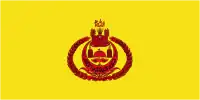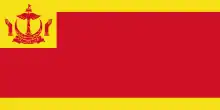 | |
| Use | Civil and state flag, civil ensign |
|---|---|
| Proportion | 1:2 |
| Adopted | 29 September 1959 |
| Design | A centered red crest of Brunei on a yellow field cut by black and white diagonal stripes (parallelograms). |
| Designed by | Yura Halim |
.jpg.webp)
The flag of Brunei has a centered emblem of Brunei on a yellow field cut by black and white diagonal stripes (parallelograms at an angle). The yellow field represents the sultan of Brunei. The red crest consists of a crescent facing upwards, joined with a parasol, with hands on the sides.
In Southeast Asia, yellow is traditionally the color of royalty, and the royal standards of Malaysia and Thailand, and the flag of Sarawak, along with the presidential flag of Indonesia, all use a yellow field as well. The crescent symbolizes Islam, the parasol symbolizes monarchy, and the hands at the side symbolize the benevolence of the government. The black and white stripes represent Brunei's chief ministers[1] who were once joint-regents and then – after the sultan came of age – senior advisors: the Pengiran Bendahara (First Minister, symbolised by a slightly thicker white stripe) and the Pengiran Pemancha (Second Minister, governing foreign affairs, symbolised by black), with the white stripe being roughly 12% wider than the black one.[2][3]
On the crescent is the national motto of Brunei in Arabic: الدائمون المحسنون بالهدى; Ad-dāʾimūna al-muḥsinūna bi-l-hudā, meaning "Always render service with God's guidance".
Below this is a banner inscribed with the name of the country in Jawi: بروني دارالسلام; Brunei Darussalam, which means ‘Brunei, the Abode of Peace’
It is one of the few national flags incorporating a diagonal line, with other examples including the DR Congo, Tanzania, Namibia, and Trinidad and Tobago.
History
The flag in its present form, except for the crest, has been in use since 1906 when Brunei became a British protectorate, following the signing of an agreement between Brunei and Great Britain. Even though Brunei was only nominally independent after this, Bruneians retained certain symbols, like the flag.[4]
The crest was superimposed in 1959 after the promulgation of the Constitution of 29 September 1959.[5]
The design was retained when the country gained full independence on 1 January 1984 as Brunei Darussalam (Brunei, Abode of Peace).

 Bruneian Empire (later protectorate), 1368–1906
Bruneian Empire (later protectorate), 1368–1906
 Protectorate of Brunei, 1906–1959
Protectorate of Brunei, 1906–1959
 Brunei Darussalam, 1959–present
Brunei Darussalam, 1959–present
Other ensigns and flags
| Flag | Type | Description | Flag Ratio |
|---|---|---|---|
 |
Brunei Armed Forces Flag. Yellow flag with three diagonal stripes white over red over black, with Armed Forces' badge in the middle. | 2:3 | |
 |
Royal Brunei Land Forces Ensign. Red ensign with the Bruneian flag in canton and the Royal Brunei Land Forces emblem in fly. | 1:2 | |
 |
Brunei Naval Ensign. White (crossless) ensign with the war flag in canton. | 1:2 | |
 |
Royal Brunei Air Force Ensign. Light blue ensign with the war flag in canton and the Royal Brunei Air Force roundel in fly. | 2:3 | |
 |
Royal Brunei Police Force flag. | Dark blue flag with the emblem in the centre. | 1:2 |
 |
Alleged Royal Brunei Navy Flag in 1601 | A sallow-tail version of the Flag of Bruneian Sultanate (Empire). | 1.2 |
Personal standards
| Flag | Type | Description | Flag Ratio |
|---|---|---|---|
 |
Standard of the Sultan | The standard of his Majesty the Sultan is yellow, incorporating his personal emblem at the centre of the standard with all its elements red. | 1:2 |
 |
Standard of ministers | A yellow-red-yellow horizontal flag with the emblem on the yellow canton. | 1:2 |
The standard of Her Majesty the Raja Isteri is light yellow, incorporating the Sultan's crest on red background at the centre of the standard.
The Perdana Wazir has also a personal standard granted to him by His Majesty the Sultan. The standard is white superimposed in the centre with the state crest in light yellow. The crest is supported by si kikil, a kris crossed by its sheath.
The personal standards of the Pengiran Bendahara, Pengiran Digadong, Pengiran Pemancha and Pengiran Temenggong (senior ministers) are white, green, black and red respectively.
The Sultan had also bestowed personal flags to lesser officials known as Pengiran Cheteria and to Pengiran and other subjects.
Among the Pengiran and dignitaries who are authorised to use personal standards are:
- Descendants of a sultan, down to four generations,
- Descendants of a wazir, down to three generations,
- Descendants of a cheteria, down to two generations,
- From menteri (non-noble officials) to damong (chiefs).
Their personal standards incorporate the state crest in red on a yellow background at the top left corner of the flags.
Colors
| Yellow | Red | White | Black | |
|---|---|---|---|---|
| RGB | 247/224/23 | 207/17/38 | 255/255/255 | 0/0/0 |
| Hexadecimal | #F7E017 | #CF1126 | #FFFFFF | #000000 |
References
- ↑ The National Geographic Magazine. National Geographic Society. 1935. p. 384.
- ↑ The Flag Bulletin. Flag Research Center. 1984. p. 76.
- ↑ Annual Report: Brunei. H.M. Stationery Office. 1946. p. 91.
- ↑ Horton, A. V. M. (1984). The British residency in Brunei, 1906-1959. Centre for South-East Asian Studies. p. 15.
- ↑ "The Brunei Darussalam State Flag". Information Department, Prime Minister's Office. Retrieved 23 March 2012.
External links
- Brunei at Flags of the World
- National Flag and Crest Government of Brunei Darussalam
- National Flag and Crest, Prime Minister's Office
- Flag and Crest Description Archived 7 March 2016 at the Wayback Machine
- History Brunei Flag